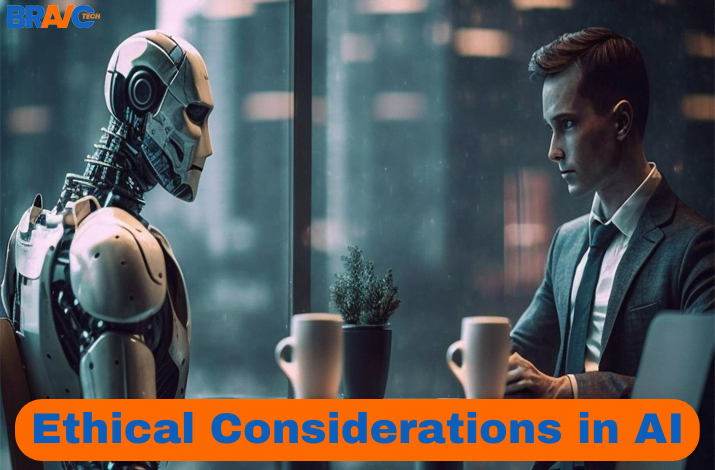Biggest Ethical Considerations in Artificial Intelligence

Artificial Intelligence’s evolution has delivered significant outcomes to a large population and working industries. With its increased application, Ai is getting a place in every field and offering numerous benefits to individuals. Furthermore, it has incredibly improved the efficiency and accuracy of the software and tools. However, it has given rise to multiple questions about human efforts and working abilities, replaced by AI tools. In this comprehensive guide, we will look forward to some of the biggest ethical considerations in Artificial Intelligence.
How Artificial Intelligence Has Revolutionized The World?
The latest development in Artificial Intelligence has added human-like performance into the products to improve their operations. Thus, AI tools work better than before and deliver comprehensive performances. Besides, automation has reduced human efforts and let industries have accurate, precise, and error-free outcomes. In this way, AI is revolutionizing the modern world and has a greater influence on all sectors. Owing to its unique and incredible benefits, almost all organizations have opted for it to produce more ergonomic responses.
Biggest Ethical Considerations In Artificial Intelligence
The extensive use of AI has not only ensured valuable benefits to industries but also paved the way for some serious problems. In the under-section, we have elaborated on some of the biggest ethical considerations in Artificial Intelligence.
1 – Data Protection
The AI tools work on the basis of data provided to them. As a result, they perform their operations and deliver the desired outcomes. However, the notable point is that you have to use consumers’ data to manage your activities and earn valuable insights from AI tools. Thus, it has posed a question about users’ and businesses’ data protection and privacy. With the help of AI software, any person can extract individual and industrial data and use it for personal concerns. In return, the companies could suffer a great loss, and questions about their transparency and users’ safety could arise. Therefore, there must be a proper strategy by which only the required data is delivered to these tools for enhanced security.
2 – Unfair Results
As mentioned above, AI tools perform operations and activities based on the input data. Thus, using them to carry out human decisions could be significant if the information provided is correct. However, making deliberated changes can affect the outcomes and change them enormously. In this way, the results will be unbiased and exhibit the element of fairness towards one side. It is one of the biggest ethical considerations of Artificial Intelligence, and using such explicit tools in legal cases can increase the problems. Therefore, the input data must have a counter-check mark to guarantee unbiased decisions.
3 – Employment Disruption
Artificial Intelligence has the potential to change the working approach and do hectic tasks swiftly through automation and robotic mechanism. Furthermore, human intelligence and machine-learning outcomes have improved their performance. Thus, AI machines and software are replacing human labor rapidly. All this results in immense profit for the industries as they have to spend less on their working staff to get error-free outcomes.
However, it is not good ethically as it has jammed the outflow of the economy. Laborers suffer a lot as they cannot find enough opportunities to show their talent and skills. Such employment disruption has increased the inflammation and security threats as there is a sharp rise in the number of robbery and theft activities. Therefore, non-profit human organizations must develop a comprehensive strategy. In this way, they could pose a limit to the use of AI tools to maintain economic balance.
4 – Hackers’ Attack And Safety Risks
Artificial Intelligence tools are highly scripted software that uses some special algorithms to perform numerous operations. In addition, their activities are controlled by developers as they deliver all the data to them. Therefore, any error in the script can cause huge problems and put data privacy at greater risk of stealing. Further, hackers and technology experts can use AI tools to work in collaboration with quantum computing to crack the algorithms swiftly and decrypt the stored information.
Thus, they can use it to get money by selling and threatening the industries. Considering all these issues, it is very important to minimize AI access to only a small population for efficient and productive outcomes. Besides, this strategy will also be helpful in eliminating many other ethical considerations in Artificial Intelligence.

5 – Transparency
Transparency is also one of the significant ethical considerations in Artificial Intelligence. In the previous section, we detailed the security risks that could be raised in the case of hacker attacks. The AI tools are not secured properly, and decoding their infrastructure is not that challenging for the experts so far. Therefore, a hacker can easily interpret it to deliver personally added false results. Thus, such outcomes can create serious damage if not checked for longer. A carefully designed input data can malfunction AI software, impacting the industrial functioning badly.
6 – Autonomous Systems and Liability
Besides other fields, Artificial Intelligence has also shown its authority in the transport system. Self-driving cars are one of the biggest advancements in the latest technological evolution. They don’t need any drivers and work on human intelligence input delivered by AI systems. It could be fascinating. However, certain ethical considerations arose with their usage.
AI-driven cars cannot make necessary and ethical decisions in case of accidents. For instance, in the case of a collision, it is fairly difficult for such systems to focus on the safety of the owner or pedestrians. As a result, it can cause a huge toll on human lives. The increased liability with the use of autonomous vehicles has also questioned the ethical considerations of Artificial Intelligence.
Final Verdicts
All these are the details about the biggest ethical considerations in Artificial Intelligence. In conclusion, AI is delivering significant advantages to individuals and industries. Thus, it has influenced businesses’ approach; they rely more on automation tools for maximum benefits. However, the extensive use of AI-based products and tools has raised critical questions about laborers working abilities and economic impacts. Therefore, a well-managed strategy is needed to promote the fair use of Artificial Intelligence to eliminate potential effects. That’s all about this guide. Stay tuned for more information!





